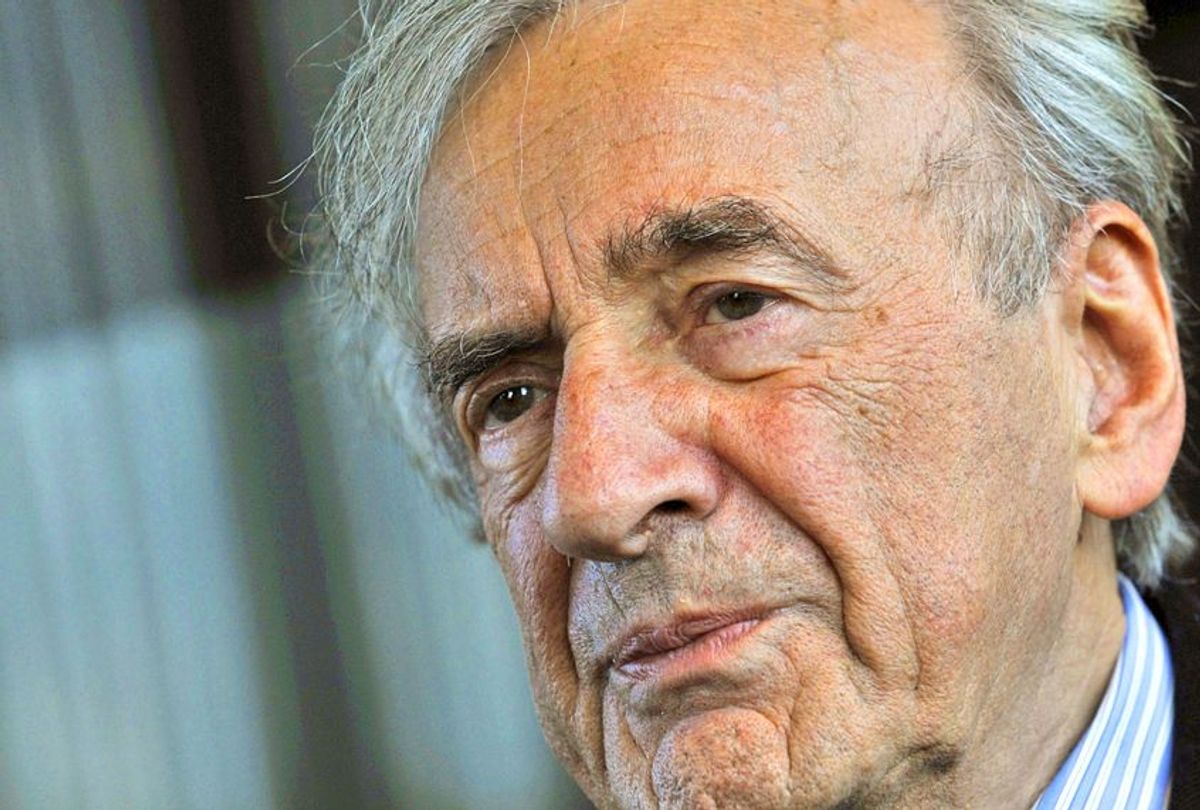"When I was 19 years old, Elie Weisel grabbed my ass," begins Jenny Listman's Medium post on her alleged encounter with the Nobel prize-winning author and human-rights advocate.
"It was a calculated act and worse than you think," she continues. "He mistook me for an ultra-religious underage girl who was unlikely to tell anyone about it. In other words, he purposefully chose to molest someone who he assumed was a minor and who would be compelled into silence."
Beneath, she recounts her interaction with Weisel during a 1989 charity event she attended with her future fiancé and his family. Specifically, she alleges that during a family photo which included the Holocaust survivor and author of "Night," Weisel "shoved me and my boyfriend apart, inserted himself between us."
As the photographer prepared to shoot, Listman says Weisel, put her hand first on her shoulder, then lowered it down her back "slowly, over a period of seconds; a physical impossibility that is possible under such circumstances."
As the photographer took the picture, "Elie Wiesel’s right hand had reached my right ass cheek, which he squeezed." Listman claims Wiesel, "immediately RAN, disappearing straight into the crowd of over 1000 people," leaving her in a state of shock, panic and disbelief. The disbelief extended to her boyfriend, who at first tried to explain it away.
Listman's post, however, is actually less about the specifics of the alleged assault and more about the personal effects of it and the ethical questions it provoked in her mind.
While other men have done, technically, worse things to me," she writes "Wiesel’s actions were, in some ways, more sorrow-inducing. Perhaps bad people do bad things. Conversely, one might hope, good people don’t do bad things."
Rhetorically asking what happens to an individual when they personally encounter bad behavior from someone considered a secular saint by the rest of the world, Listman says "You are sad beyond measure because, you believe, there are no good people." She adds "You mourn for humanity and for yourself."
Listman claims a long list of aftereffects from both Weisel's alleged assault and the actions of other men ranging from severe problems with intimacy, to general pessimism to extended mental issues. "The suicidal depression and seemingly all-day panic attacks began 18 years ago" she says. "Each experience with a man who hurt or terrorized me had removed a brick or two from a load-bearing wall in my brain."
With a non-specific reference to the resurgence of the #MeToo hashtag and the many similar allegations now being leveled against Harvey Weinstein and others, Listman discusses both the reasons why she stayed silent all these years and why she chose to reveal her claims now.
First, she lists all the reasons not to speak out, noting that friends and colleagues said to her before she published "Are you sure you want to do this? You don’t want this to hurt your career. You’ll have to deal with your kids’ reactions. You could write it and maybe have some people who you’re close to read it so you can get it off your chest instead of having everyone know." There are many, many more.
"Why would I say something now?" she asks. "I am exhausted from the guilt, fear, and shame and mostly from the twenty-eight year long burden of keeping this secret in a possibly misguided overestimation of my own capacity and responsibility to protect the world from the knowledge of something evil and ugly."
Just as crucially, she offers her claims as both an opportunity to look more closely at our own heroes, support other women and remind men of how pervasive sexual harassment is. If people rarely hear about something’s existence" she says they "assume it to be rare."
As to the potential damage she may be doing to the legacy of a man who, even after death, remains a potent voice in the Jewish community and an icon of the global human rights movement, she says:
If you are sad and in mourning for your lost icon, I am not to blame for taking him away from you. I am not to blame for robbing the Jewish community of a leader, the world of a symbol, or his family of their memories. I did not do it. He did.
No doubt, there will be many who refuse to believe Listman's story. With secondary evidence beyond reach, as it is in so many similar cases. In the end, we have only her word to weigh against Wiesel's sometimes uneven, but unavoidable and vital mass of good works.
Nevertheless the challenges to how we view masculinity and the idea of "good men" and "bad men" it raises in the time of #MeToo must be considered. None of this is easy. So much of it is hard, more so for survivors both silent and open than for the observers who must confront the moral questions they present. Listman's story demands we at least wade in and not look back.
"Listen to us with all of your energy" she says. It is, ironically, what Weisel asked of the world when he offered his Holocaust testimony. Yes, it may be difficult to hear out both narratives, but in this case that's exactly what we may have to do. Dissonance of this kind is just one of the many lesser aftereffects of sexual abuse and we can't let it get in the way.

Shares